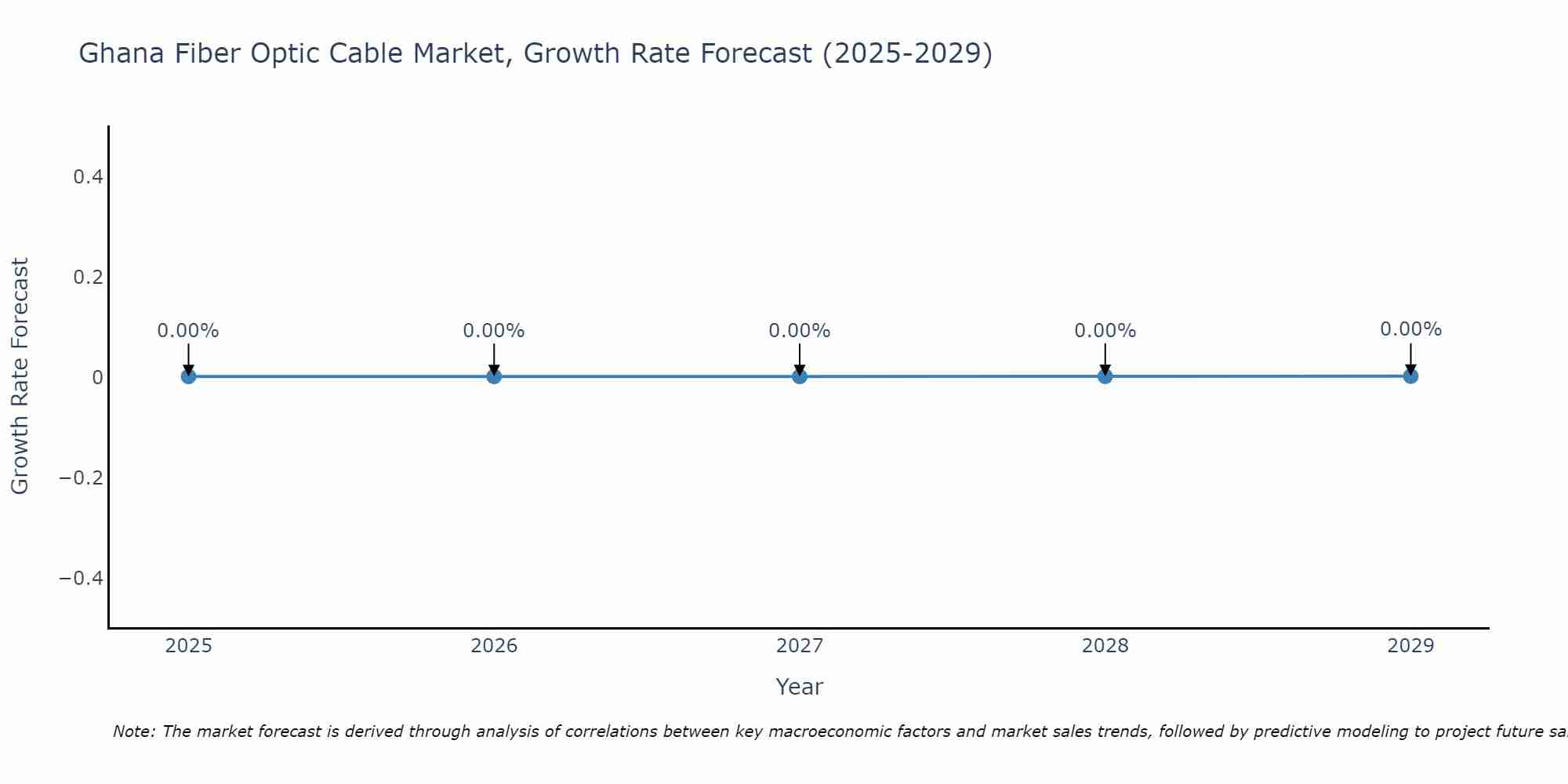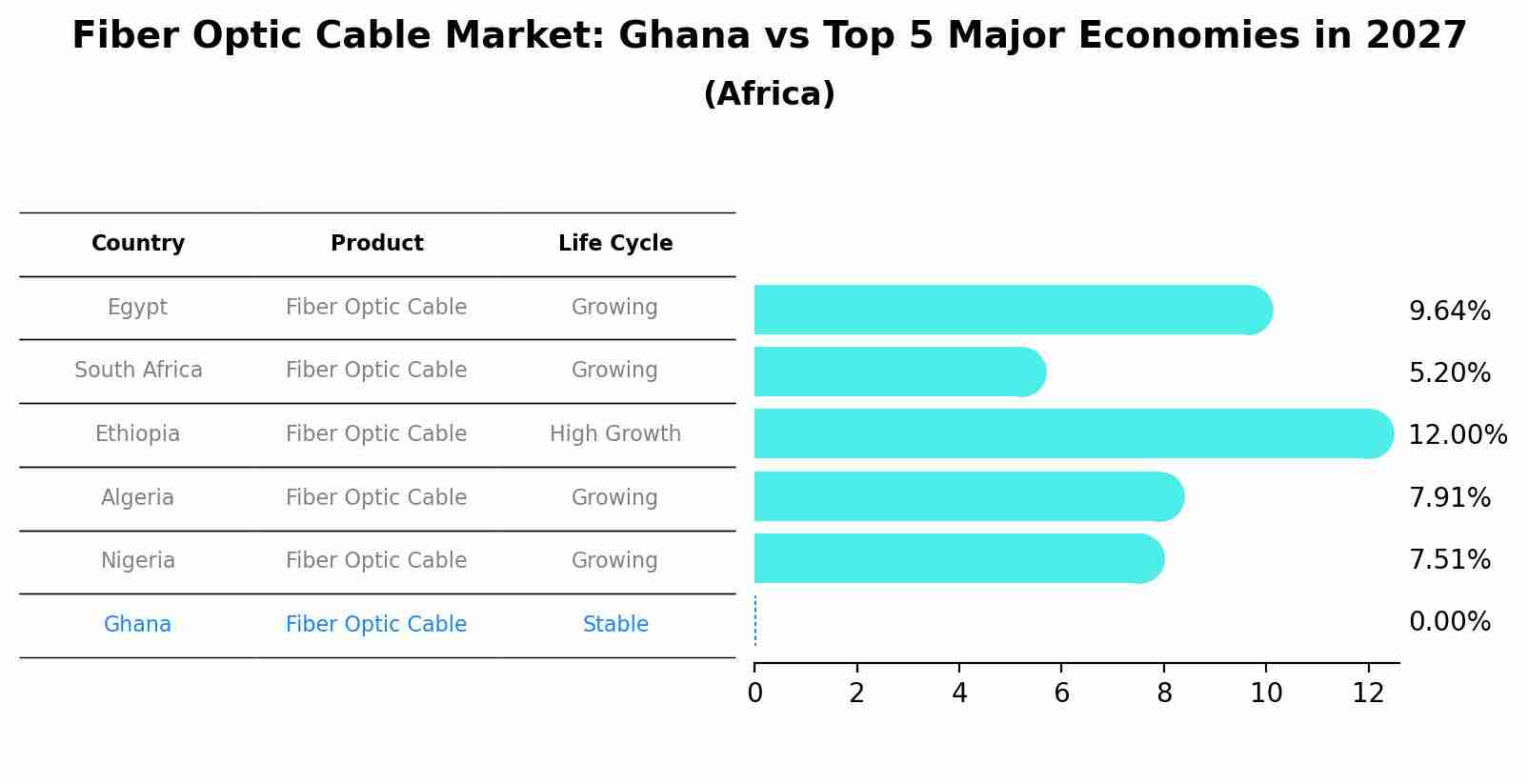Ghana Fiber Optic Cable Market (2025-2031) Outlook | Size, Value, Revenue, Growth, Forecast, Share, Analysis, Companies, Industry & Trends
| Product Code: ETC364016 | Publication Date: Aug 2022 | Updated Date: Aug 2025 | Product Type: Market Research Report | |
| Publisher: 6Wresearch | Author: Ravi Bhandari | No. of Pages: 75 | No. of Figures: 35 | No. of Tables: 20 |
Ghana Fiber Optic Cable Market Size Growth Rate
The Ghana Fiber Optic Cable Market is likely to experience consistent growth rate gains over the period 2025 to 2029. Commencing at 0.00% in 2025, growth builds up to 0.00% by 2029.

Fiber Optic Cable Market: Ghana vs Top 5 Major Economies in 2027 (Africa)
In the Africa region, the Fiber Optic Cable market in Ghana is projected to expand at a stable growth rate of 0.00% by 2027. The largest economy is Egypt, followed by South Africa, Ethiopia, Algeria and Nigeria.

Ghana Fiber Optic Cable Market Synopsis
The Ghana Fiber Optic Cable Market is currently experiencing significant growth due to increasing demand for high-speed internet services and the government`s efforts to improve digital infrastructure. Key players in the market include Vodafone Ghana, MTN Ghana, and MainOne. The market is driven by factors such as the rise in internet penetration, growing adoption of cloud services, and the need for reliable connectivity for businesses and individuals. The increasing use of fiber optic cables for telecommunication, data transmission, and broadband services is propelling market growth. With ongoing investments in expanding network coverage and improving internet speeds, the Ghana Fiber Optic Cable Market is expected to continue its upward trajectory in the coming years, providing opportunities for vendors to capitalize on the growing demand for high-quality connectivity solutions.
Ghana Fiber Optic Cable Market Trends
The Ghana Fiber Optic Cable market is experiencing significant growth driven by increasing demand for high-speed internet connectivity, expanding telecom infrastructure, and government initiatives to boost digitalization. Key trends in the market include a rise in fiber-to-the-home (FTTH) installations to support high-bandwidth applications like video streaming and online gaming. The market is witnessing a shift towards the deployment of advanced technologies such as 5G networks, cloud services, and Internet of Things (IoT) applications, driving the need for robust fiber optic networks. Telecom operators are investing in expanding their fiber optic infrastructure to meet growing consumer and business demands for reliable and high-speed internet connectivity. Additionally, the market is seeing increased competition among service providers, leading to improved quality of service and competitive pricing for consumers.
Ghana Fiber Optic Cable Market Challenges
In the Ghana Fiber Optic Cable Market, challenges include limited infrastructure development, high implementation costs, and competition from traditional copper networks. The slow pace of infrastructure development in remote and rural areas hinders the expansion of fiber optic networks across the country, limiting access to high-speed internet services for a significant portion of the population. Additionally, the high initial investment and ongoing maintenance costs associated with fiber optic technology pose financial challenges for both service providers and consumers. Furthermore, the presence of established copper networks in some areas creates competition and reluctance among consumers to switch to fiber optics. Overcoming these challenges will require increased investment in infrastructure, cost-effective deployment strategies, and effective marketing to promote the benefits of fiber optic technology to consumers.
Ghana Fiber Optic Cable Market Investment Opportunities
The Ghana Fiber Optic Cable market presents promising investment opportunities due to the increasing demand for high-speed internet connectivity and the government`s initiatives to improve the country`s digital infrastructure. Investing in fiber optic cable infrastructure development companies or telecommunications providers in Ghana could be lucrative as they work towards expanding network coverage and enhancing broadband services. Additionally, the growth of industries such as telecommunication, IT, and e-commerce in Ghana further drives the need for reliable and fast internet connectivity, creating a favorable environment for investment in the fiber optic cable market. With the potential for long-term growth and development in the sector, investing in Ghana`s fiber optic cable market could offer attractive returns for investors seeking opportunities in the country`s expanding digital economy.
Jordan Agar Market Government Policies
The Ghanaian government has implemented various policies to promote the growth of the fiber optic cable market in the country. One key policy is the National Broadband Policy, which aims to enhance broadband access and affordability for all citizens. Additionally, the government has established the National Communications Authority (NCA) to regulate and oversee the telecommunications sector, including fiber optic infrastructure development. The NCA ensures fair competition among service providers and enforces quality standards to improve the overall connectivity in Ghana. Furthermore, the government has encouraged public-private partnerships to attract investments in the fiber optic cable market and expand network coverage to underserved areas. Overall, these policies demonstrate the government`s commitment to fostering a robust and inclusive digital infrastructure in Ghana through the promotion of fiber optic technology.
Ghana Fiber Optic Cable Market Future Outlook
The Ghana Fiber Optic Cable Market is poised for substantial growth in the coming years due to increasing demand for high-speed internet connectivity and advancements in telecommunications infrastructure. The government`s initiatives to expand broadband access and digital connectivity, coupled with rising investments from telecom companies in fiber optic networks, will drive market expansion. Additionally, the growing adoption of digital technologies, such as cloud computing, IoT, and e-commerce, will further boost the demand for reliable and high-speed internet services, creating opportunities for fiber optic cable providers. With the potential for increased internet penetration and data consumption in Ghana, the fiber optic cable market is expected to experience steady growth and innovation, positioning it as a key player in the country`s digital transformation journey.
Key Highlights of the Report:
- Ghana Fiber Optic Cable Market Outlook
- Market Size of Ghana Fiber Optic Cable Market, 2024
- Forecast of Ghana Fiber Optic Cable Market, 2031
- Historical Data and Forecast of Ghana Fiber Optic Cable Revenues & Volume for the Period 2021 - 2031
- Ghana Fiber Optic Cable Market Trend Evolution
- Ghana Fiber Optic Cable Market Drivers and Challenges
- Ghana Fiber Optic Cable Price Trends
- Ghana Fiber Optic Cable Porter's Five Forces
- Ghana Fiber Optic Cable Industry Life Cycle
- Historical Data and Forecast of Ghana Fiber Optic Cable Market Revenues & Volume By Cable Type for the Period 2021 - 2031
- Historical Data and Forecast of Ghana Fiber Optic Cable Market Revenues & Volume By Single-Mode for the Period 2021 - 2031
- Historical Data and Forecast of Ghana Fiber Optic Cable Market Revenues & Volume By Multi-Mode for the Period 2021 - 2031
- Historical Data and Forecast of Ghana Fiber Optic Cable Market Revenues & Volume By Material for the Period 2021 - 2031
- Historical Data and Forecast of Ghana Fiber Optic Cable Market Revenues & Volume By Glass for the Period 2021 - 2031
- Historical Data and Forecast of Ghana Fiber Optic Cable Market Revenues & Volume By Plastic for the Period 2021 - 2031
- Historical Data and Forecast of Ghana Fiber Optic Cable Market Revenues & Volume By Application for the Period 2021 - 2031
- Historical Data and Forecast of Ghana Fiber Optic Cable Market Revenues & Volume By Communication for the Period 2021 - 2031
- Historical Data and Forecast of Ghana Fiber Optic Cable Market Revenues & Volume By Power Transmission for the Period 2021 - 2031
- Historical Data and Forecast of Ghana Fiber Optic Cable Market Revenues & Volume By Sensor for the Period 2021 - 2031
- Historical Data and Forecast of Ghana Fiber Optic Cable Market Revenues & Volume By Others for the Period 2021 - 2031
- Ghana Fiber Optic Cable Import Export Trade Statistics
- Market Opportunity Assessment By Cable Type
- Market Opportunity Assessment By Material
- Market Opportunity Assessment By Application
- Ghana Fiber Optic Cable Top Companies Market Share
- Ghana Fiber Optic Cable Competitive Benchmarking By Technical and Operational Parameters
- Ghana Fiber Optic Cable Company Profiles
- Ghana Fiber Optic Cable Key Strategic Recommendations
Frequently Asked Questions About the Market Study (FAQs):
- Single User License$ 1,995
- Department License$ 2,400
- Site License$ 3,120
- Global License$ 3,795
Search
Thought Leadership and Analyst Meet
Our Clients
Related Reports
- Germany Breakfast Food Market (2026-2032) | Industry, Share, Growth, Size, Companies, Value, Analysis, Revenue, Trends, Forecast & Outlook
- Australia Briquette Market (2025-2031) | Growth, Size, Revenue, Forecast, Analysis, Trends, Value, Share, Industry & Companies
- Vietnam System Integrator Market (2025-2031) | Size, Companies, Analysis, Industry, Value, Forecast, Growth, Trends, Revenue & Share
- ASEAN and Thailand Brain Health Supplements Market (2025-2031) | Strategy, Consumer Insights, Analysis, Investment Trends, Opportunities, Growth, Size, Share, Industry, Revenue, Segments, Value, Segmentation, Supply, Forecast, Restraints, Outlook, Competition, Drivers, Trends, Demand, Pricing Analysis, Competitive, Strategic Insights, Companies, Challenges
- ASEAN Bearings Market (2025-2031) | Strategy, Consumer Insights, Analysis, Investment Trends, Opportunities, Growth, Size, Share, Industry, Revenue, Segments, Value, Segmentation, Supply, Forecast, Restraints, Outlook, Competition, Drivers, Trends, Demand, Pricing Analysis, Competitive, Strategic Insights, Companies, Challenges
- Europe Flooring Market (2025-2031) | Outlook, Share, Industry, Trends, Forecast, Companies, Revenue, Size, Analysis, Growth & Value
- Saudi Arabia Manlift Market (2025-2031) | Outlook, Size, Growth, Trends, Companies, Industry, Revenue, Value, Share, Forecast & Analysis
- Uganda Excavator, Crane, and Wheel Loaders Market (2025-2031) | Strategy, Consumer Insights, Analysis, Investment Trends, Opportunities, Growth, Size, Share, Industry, Revenue, Segments, Value, Segmentation, Supply, Forecast, Restraints, Outlook, Competition, Drivers, Trends, Demand, Pricing Analysis, Competitive, Strategic Insights, Companies, Challenges
- Rwanda Excavator, Crane, and Wheel Loaders Market (2025-2031) | Strategy, Consumer Insights, Analysis, Investment Trends, Opportunities, Growth, Size, Share, Industry, Revenue, Segments, Value, Segmentation, Supply, Forecast, Restraints, Outlook, Competition, Drivers, Trends, Demand, Pricing Analysis, Competitive, Strategic Insights, Companies, Challenges
- Kenya Excavator, Crane, and Wheel Loaders Market (2025-2031) | Strategy, Consumer Insights, Analysis, Investment Trends, Opportunities, Growth, Size, Share, Industry, Revenue, Segments, Value, Segmentation, Supply, Forecast, Restraints, Outlook, Competition, Drivers, Trends, Demand, Pricing Analysis, Competitive, Strategic Insights, Companies, Challenges
Industry Events and Analyst Meet
Whitepaper
- Middle East & Africa Commercial Security Market Click here to view more.
- Middle East & Africa Fire Safety Systems & Equipment Market Click here to view more.
- GCC Drone Market Click here to view more.
- Middle East Lighting Fixture Market Click here to view more.
- GCC Physical & Perimeter Security Market Click here to view more.
6WResearch In News
- Doha a strategic location for EV manufacturing hub: IPA Qatar
- Demand for luxury TVs surging in the GCC, says Samsung
- Empowering Growth: The Thriving Journey of Bangladesh’s Cable Industry
- Demand for luxury TVs surging in the GCC, says Samsung
- Video call with a traditional healer? Once unthinkable, it’s now common in South Africa
- Intelligent Buildings To Smooth GCC’s Path To Net Zero


















